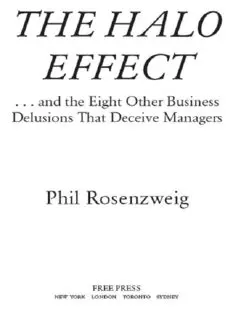
The Halo Effect: ... and the Eight Other Business Delusions That Deceive Managers PDF
Preview The Halo Effect: ... and the Eight Other Business Delusions That Deceive Managers
Free Press A Division of Simon & Schuster, Inc. 1230 Avenue of the Americas New York, NY 10020 Copyright © 2007 by Philip Rosenzweig All rights reserved, including the right of reproduction in whole or in part in any form. FREE PRESS and colophon are trademarks of Simon & Schuster, Inc. Library of Congress Cataloging-in-Publication Data Rosenzweig, Philip M., 1955– The halo effect…and the eight other business delusions that deceive managers / Phil Rosenzweig. p. cm. Includes bibliographical references 1. Industrial management — Philosophy. 2. Business enterprises — Public opinion.3. Fallacies (Logic) 4. Success in business. I. Title. HD30.19.R67 2007 658 — dc22 2006049010 ISBN-13: 978-1-4165-3858-5 ISBN-10: 1-4165-3858-5 Lyrics to “How Little We Know,” words by Carolyn Leigh and music by Philip Springer, courtesy of Alfred Publishing, Co., Inc. Visit us on the World Wide Web: http://www.SimonSays.com To my parents, Mark and Janine Rosenzweig Contents Preface Chapter One: How Little We Know Why do some companies prosper while others fail? Despite great amounts of research, there’s much we don’t know. While some studies of company performance meet the standard of science, many are better described as pseudoscience — they follow the form of science but are better described as stories. Chapter Two: The Story of Cisco Cisco Systems surged in the late 1990s with a brilliant strategy, a laserlike focus on its customers, and a masterful skill for acquisitions. When the bubble burst, Cisco was said to have bungled its strategy, neglected its customers, and made reckless acquisitions. History was rewritten in light of diminished performance. Chapter Three: Up and Down with ABB While times were good, ABB was a New Age wonder with a great corporate culture, a futuristic organization, and a hero at the helm. When it collapsed, ABB was remembered as having a complacent culture, a chaotic organization, and an arrogant leader. ABB hadn’t changed much — the difference was mainly in the eye of the beholder. Chapter Four: Halos All Around Us A central problem that clouds so much of our thinking about business is The Halo Effect. Many things we commonly believe lead to company performance — corporate culture, leadership, and more — are often simply attributions based on company performance. Chapter Five: Research to the Rescue? Can academic research about company performance overcome the Halo Effect? Only if it measures independent variables in a way that’s truly independent of performance. Even then, many studies have other flaws, including The Delusion of Correlation and Causality and The Delusion of Single Explanations. Chapter Six: Searching for Stars, Finding Halos Examining two well-known bestsellers, In Search of Excellence and Built to Last, we find strong evidence of the Halo Effect as well as other errors such as The Delusion of Connecting the Winning Dots, The Delusion of Rigorous Research, and The Delusion of Lasting Success. Chapter Seven: Delusions Piled High and Deep Subsequent studies, including Good to Great, tried to be even more elaborate and ambitious but reveal still more mistakes in their thinking about company performance, including The Delusion of Absolute Performance, The Delusion of the Wrong End of the Stick, and The Delusion of Organizational Physics. Chapter Eight: Stories, Science, and the Schizophrenic Tour de Force Many popular business books are deeply flawed as science, but are appealing because they work well as stories. They inspire and comfort their readers. Yet they also focus attention on the wrong priorities and sometimes lead managers in dangerous directions. Chapter Nine: The Mother of All Business Questions, Take Two So what does lead to high performance? One approach looks at just two elements: strategic choice and execution. Yet both are full of uncertainty, which explains why company performance can never be guaranteed and why efforts to isolate the secrets of success will always come up short. Chapter Ten: Managing Without Coconut Headsets How can managers press onward without delusions? Consider a few managers who set aside wishful thinking and guide their companies with wisdom and clarity, recognizing the uncertain nature of business performance and working to improve their probability of success. In closing, a few words for wise managers. Appendix Notes Bibliography Acknowledgments About the Author The Halo Effect and Other Business Delusions Delusion One: The Halo Effect The tendency to look at a company’s overall performance and make attributions about its culture, leadership, values, and more. In fact, many things we commonly claim drive company performance are simply attributions based on prior performance. Delusion Two: The Delusion of Correlation and Causality Two things may be correlated, but we may not know which one causes which. Does employee satisfaction lead to high performance? The evidence suggests it’s mainly the other way around — company success has a stronger impact on employee satisfaction. Delusion Three: The Delusion of Single Explanations Many studies show that a particular factor — strong company culture or customer focus or great leadership — leads to improved performance. But since many of these factors are highly correlated, the effect of each one is usually less than suggested. Delusion Four: The Delusion of Connecting the Winning Dots If we pick a number of successful companies and search for what they have in common, we’ll never isolate the reasons for their success, because we have no way of comparing them with less successful companies. Delusion Five: The Delusion of Rigorous Research If the data aren’t of good quality, it doesn’t matter how much we have gathered or how sophisticated our research methods appear to be.
